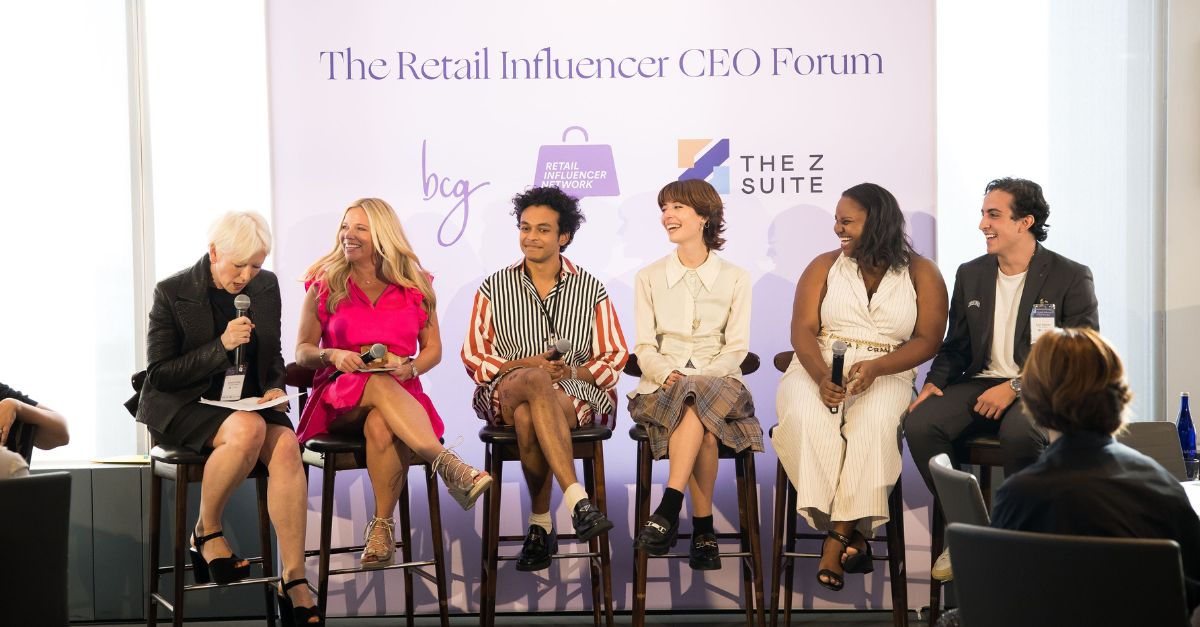Are Brand Activations the Ultimate Strategy for Capturing Gen Z’s Attention?
September 23, 2024
Unlock Gen Z's $360 billion spending power by understanding their event-driven purchasing habits. Dive into the full report for more insights.

September 23, 2024
Unlock Gen Z's $360 billion spending power by understanding their event-driven purchasing habits. Dive into the full report for more insights.

Retailers and brands are eager to understand Gen Z—how they spend, where they shop, and what motivates their purchases. According to BBC, Gen Z represents $360 billion in spending power, offering a significant opportunity to brands who can win their trust.
This month, Stacey Hawes, Chief Performance and Data Officer at MERGE, took the stage at the Retail Influencer CEO Forum in NYC, an event for brand and retail leaders aiming to connect with Gen Z consumers.
Stacey, alongside four members of the Z Suite, an exclusive network of diverse Gen Z thinkers, discussed insights from “The Event Effect: Gen Z Retail Survey,” a new quantitative study by MERGE that highlights the influential relationship between live events and Gen Z's spending behaviors. The research also gathered qualitative data by examining the spending choices of seven Gen Z consumers before, during, and after attending events this past summer.
The research reveals that the typically frugal generation is willing to spend—and often go over budget—for in-person experiences like concerts, sports games, and festivals. In fact, a significant 86% of 1,000 Gen Zers surveyed admitted they exceeded their budget when attending events.
So, what drives this overspending? Keep reading to find out how marketers can take advantage of these types of events and create engaging experiences that foster awareness, engagement, and loyalty among Gen Z.
Key Findings from the Research
Brand activations have a significant impact on Gen Z purchasing behavior. Nearly 64% of Gen Zers surveyed said brands’ advertisements or activations at events influenced them to make a purchase. Brands that provide immersive pop-up experiences, free samples, and conspicuous branding stood out the most, according to the research.
Armaan, a 24-year-old, shares his experience, “I really liked the sparkling water seltzer and would choose that brand again. However, the sponsor's advertisement for Gov Ball during Post Malone's final set was distracting and annoying, diminishing the experience for me.”
Given these insights, brands must show up authentically and transparently. Creating relevant and memorable experiences that captivate these young consumers is key to unlocking their spending.
When it comes to the top purchasing categories behind Gen Z's event-related spending, Food and Beverage (41.3%) and Apparel and Accessories (33.7%) are the leading categories. These spending patterns showcase a growing convergence between fashion, entertainment, and social experiences.
Understanding that all Gen Z consumers are not the same is essential. Brands must carefully segment audiences and understand the nuances in their motivations. Males often overspend on impulse buys like exclusive offers, while females are more influenced by emotional connections and FOMO. Meanwhile, older Gen Zs crave convenience, whereas their younger counterparts gravitate towards diversity and inclusion, often taking cues from their friends and peers.
Some consumers are substantial spenders, investing over $5K annually on events, while others remain more budget-conscious. Brands can reach both by offering exclusive merchandise for impulse buyers and affordable options for more cautious consumers.
Social media plays an influential role in shaping Gen Z's style and brand perceptions, yet it's not where they typically make their purchases. Platforms like Instagram shape style and inspire ideas, yet purchases primarily occur on the brand's website. Maintaining a strong social media presence is important for visibility, though brands should not rely solely on these platforms for sales.
Surprisingly, while sustainability matters, it’s not the top priority for Gen Z during brand activations. This generation values transparency over superficial environmental claims. Brands that genuinely commit to sustainability, steering clear of trend pandering, can build deeper loyalty with this generation.
Hawes, shares this sentiment perfectly: "If brands aren't considering marketing and advertising around events such as sports, entertainment, fashion, and concerts, they're missing a significant opportunity to reach Gen Z when their wallets are open."
Click here to view the report and explore the personal spending diaries of Gen Z shoppers.